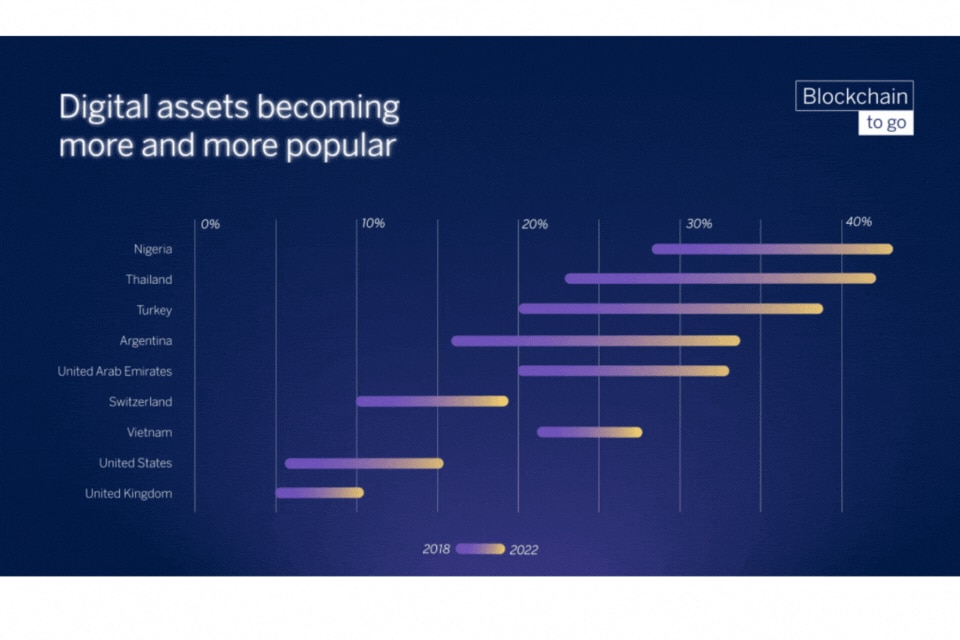The legal scenario for cryptocurrencies is diverse and variable. It depends on the country: While many are trialling state digital currencies, others have banned their mining, some have made bitcoin legal currency and others treat is as foreign currency. Switzerland continues to take steps in favor of cryptoassets.
For years, attempts have been made to implement the coordinated international regulation of blockchain-based assets, including cryptocoins. However, the picture and the penetration of these assets remains very uneven.
The platform Crypto.com, which is used to trade cryptocurrencies and has more than 80 million users, states that in 2022, there were 425 million digital coin holders worldwide, a rise of 39% from 2021. Of these, 52% have BTC (bitcoin) and 20% ETH (Ethereum). According to the report Geography of Cryptocurrency Report, carried out by Chainalysis, which measures the adoption of cryptocurrencies in 146 countries, emerging countries dominate the adoption rate. Of the 20 best-rated countries, 10 are on the list of medium-low income and economic development countries, including Vietnam, Ukraine, the Philippines and India.
🌎 America
In the U.S., US and Canada cryptocurrencies are not considered legal tender, but their governments are seeking to regulate their use in the commercial sphere and work on CBDC projects (central bank digital currencies). In some Latin American countries cryptocurrencies were prohibited due to concerns about tax evasion and money laundering. In others, they are legal tender.
- USA: Cryptoassets are treated for tax purposes as a commodity.
- Canada: Cryptocurrencies can be used to buy goods and services online or in shops that accept them.
- Mexico: Cryptocurrencies cannot be offered or traded by Mexican financial institutions.
- Brazil: They can be used privately as an alternative payment method, and are classified as a commodity. A CBDC pilot is underway, the digital real.
- Argentina: They are intangible assets subject to taxation.
- El Salvador: Bitcoin has been legal tender in the country since 2021.
- Colombia, Venezuela and Bolivia: Cryptocurrencies are illegal.
🌍 Europe
The EU has developed new standards for the regulation of cryptocurrencies under the name Markets in CryptoAssets (MiCA). These assets are legal and each member state has autonomy in terms of taxes, and the purchase and sale is free of VAT within the EU. There are differences in regulation in both the eurozone and other states.
- Germany: Cryptocurrencies can always be bought or exchanged with the authorization of the Federal Financial Supervisory Authority (BaFin). Gains over €600 are taxable.
- France: Exchanges of digital assets are not taxed, while the sale in exchange for legal currency, goods or services is.
- Portugal: Gains obtained from the acquisition and sale of cryptocurrencies are not subject to taxes, while companies that provide services related to them are taxed on capital gains.
- Spain: In the absence of specific regulations, cryptocurrencies are similar to securities, in the case of public offerings, or movable assets. They must be declared above a certain amount established by each autonomous region.
- Italy: Cryptocurrencies are considered a foreign currency. The exchange margin is exempt from VAT.
- United Kingdom: The buying and selling of cryptocurrencies is permitted. Taxes vary between individuals and companies. The United Kingdom ranks first in terms of gross transactions in Europe and sixth in the world.
- Switzerland: One of the countries that has made the most progress in secure and transparent regulation. The Federal Government has defined virtual currencies as a digital representation of a value that can be negotiated on the Internet. Financial service providers operating with cryptocurrencies must comply with the same anti-money laundering standards as traditional banks. Cryptocurrencies are subject to taxes, and the gains obtained from their purchase and sale are considered capital revenue.
- Ukraine: In 2022, the government approved new measures to regulate and, therefore, legalize exchanges and cryptocurrencies, in part as an attempt to free itself from possible foreign monetary influences. The country saw a steady increase in cryptocurrency transfers from the start of the war, in February 2022, until June that year, becoming the third country in the world in the adoption of cryptocurrencies.
- Russia: In 2022, plans were presented to ban payment in cryptocurrencies of goods and services, establishing a limit on the amount of roubles that a person can invest in cryptocurrencies.
Switzerland, a winning formula
🌍 Africa & Middle East
South Africa is the country closest to the regulation of cryptocurrencies, while in Morocco, Algeria and Egypt they are illegal. The United Arab Emirates and Saudi Arabia have both promoted cryptoassets.
🌏 Asia
Many countries, including Japan, Korea, Indonesia, Singapore, Thailand and Malaysia, have imposed state authorizations for cryptocurrency exchange and are considering CBDC projects.
- Vietnam: 21% of Vietnamese consumers declared that they used or held cryptocurrencies in 2020, and in 2022 the Asian country was, for the second consecutive year, the leader in worldwide adoption, ahead of the Philippines. The State Bank of Vietnam still does not recognize cryptocurrencies as a legal payment method, but the legislative initiatives underway are aimed at this direction.
- China: Trading and mining of cryptocurrencies has been banned. At the same time, the digital currency created by the Chinese central bank is testing the use of the virtual yuan in several provinces.
- India: Cryptocurrencies are not regulated, pending a bill and the creation of digital rupee.
- Japan: They are considered a commodity and not legal tender.
- South Korea: Cryptographic service providers must register and comply with the anti-money laundering obligations, obtaining a certificate issued by the Korean Internet & Security Agency (KISA).
🌏 Oceania
Cryptocurrencies are considered a commodity, but can be used as an exchange unit for goods and services, and other forms of money.


